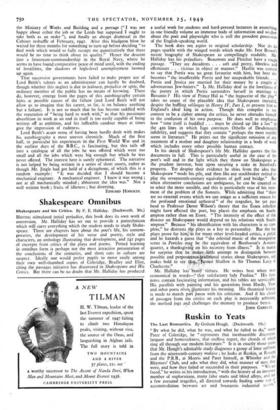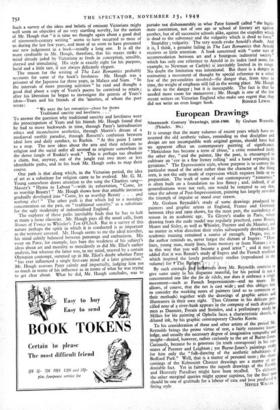Ruskin to Yeats
The Last Romantics. By Graham Hough. (Duckworth. I5s.)
"BY what he did, what he was, and what he failed to do," wrote Pater of Coleridge, he "represents that inexhaustible discontent languor and homesickness, that endless regret, the chords of MO) ring all through our modern literature." It is in exactly those terms that Mr. Hough's admirable study diagnoses a group of later sufferers, from the nineteenth-century malaise ; he looks at Ruskin, at Rossetti and the P.R.B., at Morris and Pater himself, at Whistler and the Rhymers' Club, and asks what they did, what manner of men they were, and how they failed or succeeded in their purposes. "We arc faced," he writes in his introduction, "with the history of an immense number of explorations, many false starts and blind alleys, and not a few personal tragedies, all directed towards finding some sort 0! accommodation between art and bourgeois industrial sooetv.
Such a survey of the ideas and beliefs of eminent Victorians might well seem an objective of no very startling novelty, for the notion of Mr. Hough that "it is time we thought again about a good deal of nineteenth-century writing" seems to have occurred to most of us during the last few years, and most of us seem to have presented our new judgement in a book—usually a long one. It is all the more creditable to Mr. Hough, therefore, that his essays strike a mind already jaded by Victoriana as fresh in conception, sensible, shrewd and stimulating. His style is exactly right for his purpose, lucid and a little tart, if not always delicately elegant.
The reason for the writing of The Last Romantics probably accounts for some of the book's freshness. Mr. Hough was a prisoner of the Japanese for three years, in Malaya and Siam. "In the intervals of more pressing activities" he read and thought a good deal about a copy of Yeats's poems he contrived to retain ; after his liberation he began to investigate the genesis of Ycats's ideas—Yeats and his friends of the 'nineties, of whom the poet wrote: "We were the last romantics—chose for theme Traditional sanctity and loveliness. . . ."
To answer the question why traditional sanctity and loveliness were the preoccupation of Yeats and his friends Mr. Hough found that he had to move backwards in time, through Pater's latitudinarian ethics and inconclusive aesthetics, through Morris's dream of a mediaeval earthly paradise, through Rossetti's confusion between ideal love and daily conduct, to Ruskin. "At this point I came to a stop. The new ideas about the arts and their relations to religion and the social order all seemed to originate somewhere in the dense jungle of Ruskin's work." This is perhaps too absolute a claim, but, anyway, out of the jungle run two more or less identifiable paths, and in his book Mr. Hough seeks to map their course.
One path is that along which, in the Victorian period, the idea of art as a substitute for religion came to be evolved. Mr. G. M. Young somewhere draws attention to the song the Chartists sang- Massey's "Hymn to Labour "—with its exhortation, "Come, let us worship Beauty!" Mr. Hough shows how that amiable intention gradually developed into "Come, let us worship Beauty . . . and nothing else! " The other path is that which led to a nostalgic concentration on the past, on "traditional sanctity," as a substitute for the ugly modernity of industrialised England.
The explorer of these paths inevitably finds that he has to halt at many a locus classicus. Mr. Hough pays all the usual calls, from Stones of Venice to Whistler's Ten CYClock. But in a survey of this nature perhaps the spirit in which it is conducted is as important
as the territory covered. Mr. Hough seems to me the ideal traveller, his mind calmly balanced between patronage and enthusiasm. His essay on Pater, for example, lays bare the weakness of his subject's ideas about art and morality as mercilessly as did Mr. Eliot's earlier analysis, but whereas the latter was, to my mind, marred by a certain Olympian contempt, summed up in Mr. Eliot's doubt whether Pater "has ever influenced a single first-rate mind of a later generation," Mr. Hough assesses Pater calmly and impartially, judging him not so much in terms of his influence as in terms of what he was trying to get clear about. What he did, Mr. Hough concludes, was to partake not dishonourably in what Pater himself called "the legiti- mate contention, not of one age or school of literary art against another, but of all successive schools alike, against the stupidity which is dead to the substance and the vulgarity which is dead to form."
Stupidity ; vulgarity. The very words evoke Arnold's shade. And it is, I think, a genuine failing in The Last Romantics that Arnold receives so little attention. A book concerned with "some sort of accommodation between art and a bourgeois industrial society" which has only one reference to Arnold in its index (and none, for example, to Newman or Carlyle) is inevitably limited in its range. No doubt the limitation was intentional. But there is a danger in estimating a movement of thought by special reference to a select few of the personalities involved—the danger that, from time to time, the weight of emphasis will fall in the wrong place. Mr. Hough is alive to the danger ; but it is inescapable. The fact is that he needed more room for manoeuvre ; Mr. Hough is one of the few recent writers on Victorian England who make one regret that they
did not write an even longer book. RONALD LEWIN.







































 Previous page
Previous page